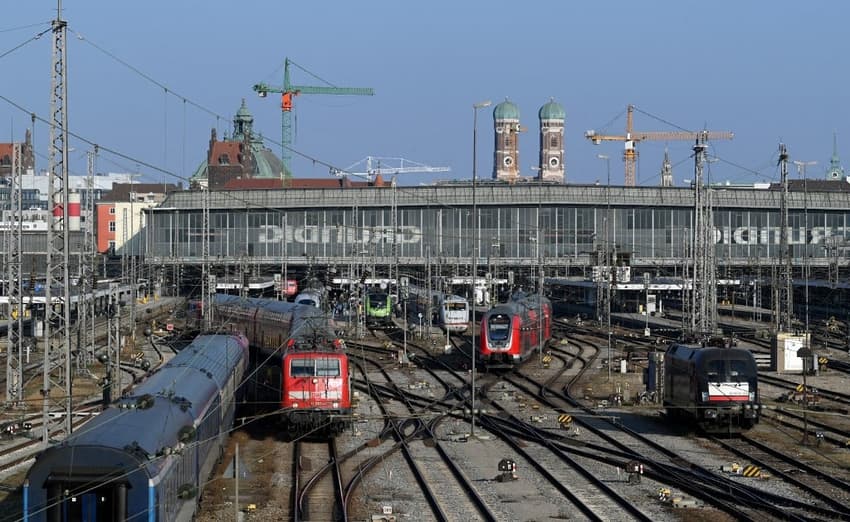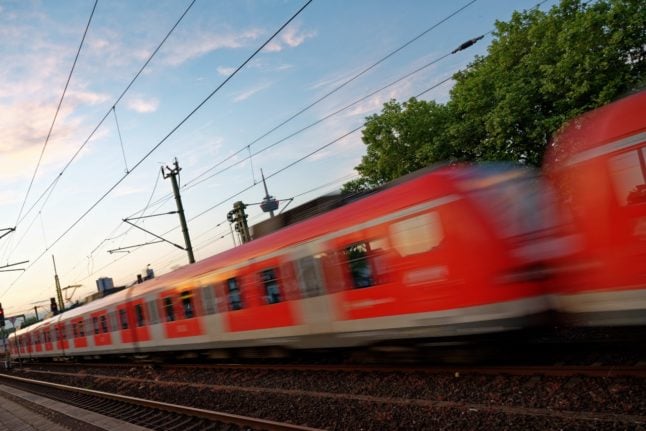INTERVIEW: 'Germany's €49 public transport ticket is not a game changer'

The new €49 nationwide ticket for public transport in Germany is overwhelming transport companies with its popularity. But one expert says the overall social and environmental impact will be negligible.
As Germany’s €49 ticket launched on May 1st, Deutsche Bahn’s website crashed with demand. At some service centres, long lines formed to either buy the ticket or work out last minute issues.
Federal Transport Minister Volker Wissing (FDP) has dubbed it Germany’s biggest revolution in public transport fares, allowing subscribers to travel on any local or regional transport in the country for a monthly fee of €49, while excluding long distance trains.
For Christian Böttger, a transport professor at the HTW university in Berlin, it certainly is revolutionary – in that it spends an unprecedented amount of money to achieve less than impressive results.
Böttger says the ticket has German governments, particularly the federal government, spending a lot of money to mostly subsidise people who are already using public transport. The governing traffic light coalition’s goal is to both help relieve financial pressures on families dealing with higher cost of living and to help the environment by enticing more people to ditch their cars in favour of buses or trains.
Böttger says the ticket is likely to fail on both counts.
“It will only benefit a few people who really travel a lot,” he told the latest episode of The Local’s Germany in Focus podcast. “All the current users benefit from the decreased prices, but it will not generate a significant number of new users.”
READ ALSO: PODCAST: Why Germany wants people to move to the countryside and the €49 ticket’s rocky start
Böttger says it amounts to a small cost reduction for middle class people who could probably afford a regular ticket anyway. “People will benefit from €10 to €20 per month, which is nice to have but not a game changer.”
Meanwhile, poorer people already have access to cheaper social tickets in many places. State governments are working on combining those with the €49 ticket to increase its benefits. But Böttger says federal and state governments still haven’t solved the question of how funding for those will work – leaving poorer people in Germany missing out on a cheaper Deutschlandticket in the meantime.
As for an increase in passengers, Böttger says we can expect to see many of the same results as the €9 ticket for three months in 2022, which barely increased public transport use in Germany’s major cities but saw an uptick on regional trains in particular.
So far though, an estimated three million people have bought the €49 ticket, with estimates holding that about 750,000 of those people have never had a subscription for public transport before.

An S-Bahn train in Cologne. Photo: picture alliance/dpa | Henning Kaiser
READ ALSO: Demand for Germany’s €49 transport ticket crashes Deutsche Bahn website
Böttger says one group in particular really stands to benefit.
“A significant share of the subsidies will go to the middle class living in the suburbs,” he says, whose subscription costs for public transport would normally be a lot higher. “They will have a heavy decrease in the costs they have.”
But he says most of these people are already well off.
Böttger says it does make longer distance commutes more attractive, which could have climate impacts due to a demand for larger, single family homes.
READ ALSO:
- Who benefits the most (and least) from Germany's new €49 ticket?
- Why Germany wants families to move to the countryside
Böttger says one of his other main concerns is the amount of money being spent on the €49 ticket that could be better spent improving the system’s infrastructure – pointing out that the ticket cost will cost €4-5 billion in its initial phase, to say nothing of costs if it gets extended.
“Money isn’t really the core thing of changing transport habits in Germany,” Böttger says. Instead, there are "capacity constraints" on the routes into major cities that will need infrastructure upgrades to fix.
Böttger says the government is currently dedicating just €2 billion to new construction by comparison – less than half of the cost of the €49 ticket.
Comments (1)
See Also
As Germany’s €49 ticket launched on May 1st, Deutsche Bahn’s website crashed with demand. At some service centres, long lines formed to either buy the ticket or work out last minute issues.
Federal Transport Minister Volker Wissing (FDP) has dubbed it Germany’s biggest revolution in public transport fares, allowing subscribers to travel on any local or regional transport in the country for a monthly fee of €49, while excluding long distance trains.
For Christian Böttger, a transport professor at the HTW university in Berlin, it certainly is revolutionary – in that it spends an unprecedented amount of money to achieve less than impressive results.
Böttger says the ticket has German governments, particularly the federal government, spending a lot of money to mostly subsidise people who are already using public transport. The governing traffic light coalition’s goal is to both help relieve financial pressures on families dealing with higher cost of living and to help the environment by enticing more people to ditch their cars in favour of buses or trains.
Böttger says the ticket is likely to fail on both counts.
“It will only benefit a few people who really travel a lot,” he told the latest episode of The Local’s Germany in Focus podcast. “All the current users benefit from the decreased prices, but it will not generate a significant number of new users.”
READ ALSO: PODCAST: Why Germany wants people to move to the countryside and the €49 ticket’s rocky start
Böttger says it amounts to a small cost reduction for middle class people who could probably afford a regular ticket anyway. “People will benefit from €10 to €20 per month, which is nice to have but not a game changer.”
Meanwhile, poorer people already have access to cheaper social tickets in many places. State governments are working on combining those with the €49 ticket to increase its benefits. But Böttger says federal and state governments still haven’t solved the question of how funding for those will work – leaving poorer people in Germany missing out on a cheaper Deutschlandticket in the meantime.
As for an increase in passengers, Böttger says we can expect to see many of the same results as the €9 ticket for three months in 2022, which barely increased public transport use in Germany’s major cities but saw an uptick on regional trains in particular.
So far though, an estimated three million people have bought the €49 ticket, with estimates holding that about 750,000 of those people have never had a subscription for public transport before.

READ ALSO: Demand for Germany’s €49 transport ticket crashes Deutsche Bahn website
Böttger says one group in particular really stands to benefit.
“A significant share of the subsidies will go to the middle class living in the suburbs,” he says, whose subscription costs for public transport would normally be a lot higher. “They will have a heavy decrease in the costs they have.”
But he says most of these people are already well off.
Böttger says it does make longer distance commutes more attractive, which could have climate impacts due to a demand for larger, single family homes.
READ ALSO:
- Who benefits the most (and least) from Germany's new €49 ticket?
- Why Germany wants families to move to the countryside
Böttger says one of his other main concerns is the amount of money being spent on the €49 ticket that could be better spent improving the system’s infrastructure – pointing out that the ticket cost will cost €4-5 billion in its initial phase, to say nothing of costs if it gets extended.
“Money isn’t really the core thing of changing transport habits in Germany,” Böttger says. Instead, there are "capacity constraints" on the routes into major cities that will need infrastructure upgrades to fix.
Böttger says the government is currently dedicating just €2 billion to new construction by comparison – less than half of the cost of the €49 ticket.
Join the conversation in our comments section below. Share your own views and experience and if you have a question or suggestion for our journalists then email us at [email protected].
Please keep comments civil, constructive and on topic – and make sure to read our terms of use before getting involved.
Please log in here to leave a comment.